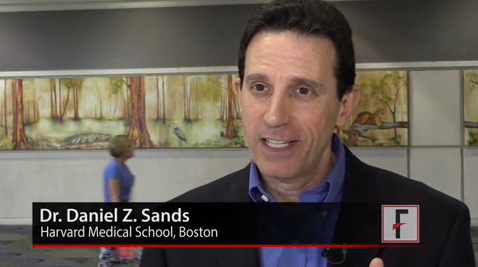User login
ORLANDO – Asking your patients about where they get their health information online is the first step toward helping them become "e-patients" – engaged patients who change their behaviors to improve their health, explains Dr. Daniel Sands.
And a willingness to answer a patient’s question with "I don’t know" can be the first step to becoming an engaged physician.
Dr. Sands has coauthored the book "Let Patients Help!" with Dave deBronkart, better known as "e-Patient Dave." He’s also the cofounder and cochair of the Society for Participatory Medicine, so he knows a thing or two about engaging patients in their health care and creating better outcomes.
In a video interview during the annual meeting of the American College of Physicians, Dr. Sands, who is with the department of medicine at Harvard Medical School in Boston, explains how physicians can use patients’ own online searches for health care answers to better involve patients in their health, and how physicians can work together with patients via technology to create a more satisfying experience in their practices.
The video associated with this article is no longer available on this site. Please view all of our videos on the MDedge YouTube channel
On Twitter @naseemmiller
ORLANDO – Asking your patients about where they get their health information online is the first step toward helping them become "e-patients" – engaged patients who change their behaviors to improve their health, explains Dr. Daniel Sands.
And a willingness to answer a patient’s question with "I don’t know" can be the first step to becoming an engaged physician.
Dr. Sands has coauthored the book "Let Patients Help!" with Dave deBronkart, better known as "e-Patient Dave." He’s also the cofounder and cochair of the Society for Participatory Medicine, so he knows a thing or two about engaging patients in their health care and creating better outcomes.
In a video interview during the annual meeting of the American College of Physicians, Dr. Sands, who is with the department of medicine at Harvard Medical School in Boston, explains how physicians can use patients’ own online searches for health care answers to better involve patients in their health, and how physicians can work together with patients via technology to create a more satisfying experience in their practices.
The video associated with this article is no longer available on this site. Please view all of our videos on the MDedge YouTube channel
On Twitter @naseemmiller
ORLANDO – Asking your patients about where they get their health information online is the first step toward helping them become "e-patients" – engaged patients who change their behaviors to improve their health, explains Dr. Daniel Sands.
And a willingness to answer a patient’s question with "I don’t know" can be the first step to becoming an engaged physician.
Dr. Sands has coauthored the book "Let Patients Help!" with Dave deBronkart, better known as "e-Patient Dave." He’s also the cofounder and cochair of the Society for Participatory Medicine, so he knows a thing or two about engaging patients in their health care and creating better outcomes.
In a video interview during the annual meeting of the American College of Physicians, Dr. Sands, who is with the department of medicine at Harvard Medical School in Boston, explains how physicians can use patients’ own online searches for health care answers to better involve patients in their health, and how physicians can work together with patients via technology to create a more satisfying experience in their practices.
The video associated with this article is no longer available on this site. Please view all of our videos on the MDedge YouTube channel
On Twitter @naseemmiller
AT ACP INTERNAL MEDICINE 2014
